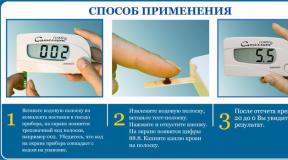Lenses after laser vision correction. Can lenses be worn after surgery? Lenses should not be worn after laser vision correction
If your vision is not good enough after LASIK or other refractive surgery, you may consider using gas permeable or hybrid contact lenses to improve your vision. Such contact lenses have a smooth and hard surface. These lenses will help correct optical imperfections that glasses and soft contact lenses cannot correct.
Why can't I see clearly after refractive surgery?
In spite of high performance the success of the operation, LASIK, PRK and other procedures laser correction vision, do not guarantee perfect vision for everyone. Your results depend largely on the unique structure of the cornea, the response to the laser, and how the tissue heals after surgery.
LASIK and other laser vision correction procedures reshape the front surface of your eye by removing microscopic pieces of corneal tissue in just the right amount. Sometimes this can lead to an uneven shape of the cornea, which can make your vision less clear after surgery than it was when you wore glasses or contact lenses before surgery.
When to start using contact lenses
Many people who do not have good vision after refractive surgery may experience problems that are mild and quite tolerable, many do not even notice them. But for others, postoperative vision problems can reduce overall quality of life, such as eye fatigue, headaches, and difficulty driving at night.
Glare, halos, flashes, starbursts around bright objects (headlights, street lights). LASIK eye surgery and other procedures can also sometimes cause astigmatism to develop.
Sometimes these disorders can be corrected by a second operation. But your cornea may be too thin for revision surgery. In this case, gas-permeable contact lenses or hybrid contact lenses.
Gas permeable contact lenses after surgery
Gas permeable contact lenses are rigid contact lenses that retain their shape on the eye due to the density of their material, unlike soft contact lenses, due to which they are less deformed during eye blinking, which allows the image to remain stable.
In comparison, soft contact lenses are more flexible, causing their shape to change at the moment of blinking, which means that soft contact lenses cannot achieve the same effect as gas permeable lenses.
Ordinary glasses also do not allow you to change the bumps on the cornea. Glasses can only correct basic refractions - myopia, hyperopia and astigmatism.
Special design contact lenses for the postoperative eye
LASIK and other laser refractive surgeries can significantly change the shape of the cornea, putting contact lenses on postoperative eye is more complex process than by eye with the usually shaped cornea. In this case, special design gas permeable or hybrid lenses are required.
Modified gas permeable lens designs can have a larger diameter, aspheric design where the lens is much flatter at the center than at the periphery, similar to those used in orthokeratology to correct myopia and astigmatism without surgery. Many ophthalmologists recommend these lenses for those who do not want laser vision correction.
If you did not wear gas-tight lenses before the operation, you will need time to adapt to them. You may need to wear the lenses part-time at first before you feel comfortable wearing them. Putting gas-tight contact lenses on eyes that have undergone refractive surgery requires special skills.
Hybrid contact lenses and high-definition glasses
An alternative to gas permeable contact lenses for vision correction after eye surgery are hybrid contact lenses and high-definition glasses.
In most cases, hybrid contact lenses are effective as gas permeable contact lenses in correcting aberrations after refractive surgery and allow easier adaptation to gas permeable lenses. When worn, hybrid lenses are comparable to soft contact lenses.
High-definition glasses are a good choice for correcting minor refractive errors that may remain after surgery.
If you have anything to add, be sure to leave a comment.
Those who use lenses are wondering if it will be possible to continue wearing them after laser correction. It is worth noting that such an operation may not give the desired result. In this case, the ophthalmologist will again recommend wearing optical aids. How to determine whether contact lenses are required after laser correction, and how to choose them correctly, you will learn from our article.
cool
send
TOP 3 myths about laser vision correction
Expert opinion
Nosova Yulia Vladimirovna
Ophthalmologist the highest category. Candidate of Medical Sciences.
Laser vision correction is an effective and painless type of surgical intervention. This operation has been performed for more than 30 years to get rid of astigmatism, myopia and hypermetropia. The essence of the procedure is to change the upper layer of the cornea of the eye, which helps to achieve the desired curvature corresponding to the required optical parameters. But, despite its simplicity, laser correction has given rise to many myths.
Most of them have no basis, and are ordinary bikes. However, among them, it is worth highlighting the three most dangerous ones that make people afraid of the operation.
MYTH #1. The effect of laser correction will pass after a while.
After surgery, a person's vision may be unstable for a while. But after 5-8 days, the eyes return to normal, and are fully restored by the third month after the correction. After that, the result obtained does not change either in a year or in ten years.
For some reason, some believe that laser correction should protect the eyes from other diseases that the human body may be exposed to, and can even prevent the unpleasant consequences of mechanical injuries. But this is also a myth.
MYTH #2. Laser correction is prohibited for nulliparous women
This operation is equally effective and available both for those who have given birth and for those who are just going to have children. But still there are some nuances associated with this difficult period in a woman's life.
You should not plan pregnancy in the first few months after laser correction or directly during this period. Although, there are some exceptions, since a lot depends on the method of correction.
After PRK, the cornea of the eye may become cloudy during the period of hormonal changes, especially in the first trimester of pregnancy. At the same time, hormonal changes cannot affect the results of LASIK in any way.
IMPORTANT! If a woman urgently needs laser correction during pregnancy, she should definitely consult with her doctor before making a final decision.
MYTH #3. After the operation, you can not play sports and go to the sauna at all.
Carrying out laser correction will not affect the future life and activity of a person. After complete recovery of the eyes, you can return to your usual lifestyle, which includes visiting the gym, swimming pool or sauna.

In addition, the patient can rest without any restrictions in hot or, conversely, cold countries. Those who still do not believe in the absence of restrictions should know that athletes, extreme recreation enthusiasts and even pilots often resort to such vision correction.
Why can't I see clearly after surgery?
Blurred vision after laser correction can be due to several factors:
- Individual intolerance to the operation. This leads to the ineffectiveness of laser correction to improve vision;
- Non-compliance with the doctor's recommendations for preparing for surgery. For example, wearing contact lenses until the day of the procedure. This can cause complications during the operation, and, as a result, the lack of clarity of vision after it;
- Severe damage to the mucous membrane of the eye during surgery. This can happen due to the inexperience of the doctor;
- Ignoring the doctor's recommendations for eye care after surgery.
IMPORTANT! To avoid possible unpleasant consequences, try to follow all the doctor's recommendations for preliminary preparation for surgery and for eye care after it.
Why is it prescribed to wear lenses after laser correction
The fact is that, PRK and other laser correction procedures do not guarantee that your vision will become perfect. The result of the operation largely depends on the initial data and structural features of your eye, the reaction to the laser and the healing process after the operation.
Laser surgery reshapes the front surface of the human eye by removing microscopic particles of corneal tissue in the required amount. Sometimes this leads to unevenness of the cornea, which makes vision less clear than it was before the operation with glasses or lenses.

Some patients do not feel improvement in vision after correction. Most often, they complain of the following symptoms:
- Increased eye fatigue during prolonged work at a computer or with prolonged use of a smartphone;
- Frequent headaches;
- Discomfort while driving;
- Poor visibility at night
- Frequent appearance of flies, glare, halos and partial blurring of the visible image.
To solve this problem, doctors suggest a second operation. But it is not always possible, so only wearing lenses is available for such patients.
hard lenses
Laser correction greatly changes the original shape of the cornea of the eyes, so wearing the usual lenses that the patient used before the operation is not possible. The fact is that with each blinking, such lenses will be slightly deformed, which will significantly distort the picture perceived by the eye. For this, more is needed. Such lenses are also called night lenses, or gas permeable lenses.
This model is characterized by a wide diameter, comfortable spherical shape, due to which the middle of the lens has a more flattened shape. Compared to standard soft models, these optical devices are especially durable, which makes them resistant to various deformations during blinking.
For those who have not worn hard lenses before, it takes some time to get used to them. Therefore, at first some discomfort may be felt when using them. Doctors even advise wearing such optics for only half a day, until the eyes fully adapt.
This option is an alternative for patients who have not been able to adapt to more rigid models. The hybrid version may be more comfortable to wear as it is made from softer polymers. Getting used to such optics can take only a few days.

Laser vision correction is an invasive treatment method aimed at correcting refractive problems, its goal is to relieve the patient of the need to use glasses and optical lenses. Unfortunately, such treatment does not always guarantee the achievement of the desired results, and vision remains insufficiently clear and good. Then Acuvue oasys 1 Day contact lenses come to the rescue.
Laser and aftermath
The results of refractive surgery depend on many factors: the individual characteristics of the cornea, the response to the laser beam, and the rate of tissue regeneration. In addition, during the formation of a flap flap, microscopic irregularities appear on the cornea, which reduce the comfort of vision. There are increased dryness, rapid visual fatigue, difficulties with driving. Various glare and rainbow halos may appear around luminous objects (headlights, lamps of lanterns). Carrying out an additional procedure is not always permissible due to the strong thinning of the cornea.
There is an exit
To level out negative sensations, doctors prescribe the wearing of special optical lenses. Most standard soft lenses do not fit well, so gas permeable and hybrid optics should be your choice.
Gas permeable lenses have increased rigidity and are less deformed. Their main difference from the usual soft models is that while wearing, they maintain the correct shape of the cornea and eliminate visual distortions. When choosing such optics, the main attention should be paid to their gas permeability index: a low index indicates poor oxygen transmission. The use of rigid lenses requires some adjustment period. It is recommended to switch to wearing them gradually, starting with a few hours a day.
Hybrid lenses are much more comfortable than gas-permeable ones and do not require long adaptation. They have a hard center and a soft polymer edge. Prolonged wearing of such lenses often causes complications, so they are recommended during the period of getting used to wearing hard lenses.
The recovery period after LKS passes quickly and easily, but it plays an important role in terms of the effectiveness of laser treatment. There are a number of factors that can affect the healing process of the wound surface. This can not only minimize the efficiency laser coagulation retina, but also lead to the development of a variety of exacerbations.
In connection with the foregoing, it is very important to adhere to all the recommendations of the doctor and seek qualified help in a timely manner when negative phenomena appear.
The course of the postoperative period after
Based on the type medical institution, in which the procedure in question was performed, the patient can be left in the clinic for a couple of days - or they can go home a couple of hours after the operation. The second option is practiced more often. In such a situation, after complete restoration of visual function (about 2 hours), the doctor conducts a control examination of the fundus under the slit lamp.
The first day after laser exposure, the surgical site swells and turns red. With physical activity, as well as with eye strain, eye and headaches occur. Often, these conditions resolve themselves after 2-3 days, but if the doctor's recommendations are not followed, they can drag on for a longer period.
Complete retinal repair usually takes 2 weeks.
The specified period may increase, depending on the individual characteristics of the patient's body.
Video: Laser coagulation of the retina
Early recovery period after LKS - what is possible, what is not?
Due to the fact that the first few days after the manipulation in question, the patient will be disturbed pain, he is assigned painkiller eye drops.
In order to prevent infection of the operating site, they are also used anti-inflammatory topical agents.
To minimize the risk of complications, before the formation of a high-quality adhesion after laser exposure (which takes, on average, 14 days), the following recommendations should be followed:
- Do not rub your eyes with your hands and try not to touch them.
- Keep yourself away colds: first of all, the wound surface will suffer. In this regard, it is better not to visit social events, as well as places where there are many children.
- Do not overstrain your eyes with reading, watching TV, needlework, and driving a vehicle.
- Wear sunglasses when you go outside. On the day of the operation, it is better not to go outside, because. There is marked photophobia.
- Don't lift anything heavy. Even carrying a 1kg bag can cause eye/head pain. At the end of the rehabilitation period, it is not recommended to lift weights weighing more than 5 kg.
- Refuse to engage in sports in which there is a high risk of injury, which provoke vibrations, shaking of the body (running, jumping, etc.). The first day after this procedure, it is better to organize bed rest, and take a vacation at work until full recovery.
- Limit the amount of salt, spices, liquids in the diet. The same goes for drinking alcohol and caffeinated drinks. In the aspect of smoking, there are no prohibitions, however, getting smoke into the eyes causes discomfort.
- Refusal of decorative cosmetics: mascara, shadows, etc. It is also forbidden to wipe the eyelids with alcohol-containing tonics.
- Protect yourself from stressful situations and experiences as much as possible.
- Avoid tilting the torso forward (including when washing your hair). Sleep in such a way that the legs are not higher than the head. The first night after laser coagulation is better to sleep on your back.
If the manipulation in question was performed on a person with diabetes should monitor his blood sugar levels.
For those who suffer from regular promotion blood pressure , you need to control this indicator and take the necessary drugs on time.
Late recovery period after laser coagulation of the retina - prevention of complications and lifestyle
A couple of weeks After laser treatment, the patient must come to an appointment with an ophthalmologist for a follow-up examination.
In the presence of diabetes such visits should be more frequent: monthly for the first 6 months. In the next six months, preventive examinations should be carried out every 3 months, and in the future (in the absence of any exacerbations), the number of visits is reduced to 2 per year. During such appointments, the doctor checks the fundus for thinning of the retina.
At sharp deterioration visual abilities, the appearance of "flies" in the eyes, flashes, other uncomfortable sensations in the area of laser exposure, you need to see a doctor immediately!
Vision correction after laser coagulation of the retina - when can I wear glasses or lenses?
In the absence of any aggravation after the procedure in question, lenses / glasses can be worn already the day after surgery.
If there is discomfort in the area of laser exposure, it is better to use optical devices for vision correction. for 2-3 days.
If the patient has corneal edema, inflammatory processes in the region of the iris, or in the field of view appear dark spots- wearing contact lenses should be postponed until the elimination of these phenomena.

What to do if the eye hurts, other complications arise after laser coagulation of the retina?
In the first days after the procedure under consideration, it is extremely rare, but the following negative conditions may still occur:
- Inflammatory phenomena in the conjunctiva zone. It has to do with education small wounds under laser exposure, which under the influence of various factors can become inflamed. To prevent this exacerbation, anti-inflammatory drops are prescribed. If infection occurs, antibiotics are used.
- in which patients complain of discomfort and burning in the eyes. A similar phenomenon is a consequence of insufficient production of lacrimal fluid. When yawning, the patient feels significant relief. The complication under consideration can be eliminated through the use of special eye drops.
- Repeated retinal detachment. It can occur if the underlying ailment has not been established or cured, as well as with extensive initial retinal detachment. In this condition, repeated laser coagulation is required.
- Violation of visual functions. It can be provoked by edema in the first days after manipulation. In such a situation, no action should be taken - the situation stabilizes after the swelling subsides. If the field of vision is noticeably narrowed, and flies or dark spots appear before the eyes, you should immediately seek help.
The ability to wear contact lenses after laser vision correction is a concern for many people. Because the procedure may not desired effect or with its help only part of the problems with the eyes were solved, glasses or contact correctors could compensate for the unsatisfactory condition. If the use of glasses for a person is unacceptable, then wearing optics - the only way out. Contact lenses after surgery, the choice of their type, restrictions become important.
Is it possible to wear?
The operation is addressed with a desire to improve vision, solve the problem of ophthalmic pathology or remove a cosmetic defect. Despite the popularity of the procedure, no clinic can guarantee the quality and predict the results of the operation - a number of individual indicators decide the outcome. Vision may not be restored, it may even worsen the original condition. Discomfort may be little noticeable, but sometimes it does not allow you to live normally: astigmatism develops, eyes get tired quickly, they cannot see at dusk, etc.
You can wear lenses after laser vision correction. In some cases, doctors recommend doing this. The indications are as follows:
- To compensate when a full recovery has not occurred.
- Deterioration. Vision correction is accompanied by the removal of microscopic particles of the cornea, its shape becomes uneven. As a result - loss of clarity of vision or the appearance of astigmatism. If the cornea is already thin and re-correction is not possible, ophthalmologists may advise wearing lenses.
- Ophthalmic pathologies. Some operations are not accompanied by correction of visual acuity. After correcting individual pathologies, the need to wear glasses or lenses persists.
- Acceleration of rehabilitation, which is possible with the help of temporary lenses.
- aesthetic changes. Colored, if a person wants to change the shade or color of the eyes.
What are needed?
 After surgery on the eyes, doctors recommend the use of rigid lenses.
After surgery on the eyes, doctors recommend the use of rigid lenses.
All optical products are divided into types:
- rigid, which do not change shape;
- soft, that take the shape of the eye, for example, when blinking;
- hybrid, which have the characteristics of both hard and soft.
Another conditional division is gas permeability, that is, the ability of the eye to “breathe”. If it is not there, the eye dries up, gets tired quickly. Accordingly, the selection criterion is high degree gas permeability. Both soft and hard samples give access to air, only soft ones have the highest rates - no higher than 38 units; in hard ones - over 200. Under the hard shell, the cornea breathes better. The lack of close contact of surfaces does not allow pathogenic bacteria to spread. In addition, after correction, the cornea changes and it becomes difficult to put on soft ones. For the safety of vision after surgery, ophthalmologists advise switching from soft to hard, gas-permeable specimens.
Wearing hard options is the most gentle: they rub less, have high breathability, and do not contribute to the spread of bacteria.
You can wear two varieties - hard and hybrid. The former are characterized by a large diameter and an aspherical shape (the lens is almost flat in the central part, and convex at the edges). They are made of polymers that retain their original state and allow air to pass through. The second - hybrid - soft at the edges and hard in the center, allow you to better adapt if the patient used only soft ones before.
Features: Is there an alternative?
The first days of corrective optics should not be worn all day, so the organs of vision will gradually get used to it.
To maximize the effect of using optical correctors, you need to give your eye time to get used to it. Ophthalmologists advise first to wear part-time to give rest to the organs of vision, and start with hybrid ones, as they are more comfortable. Often in postoperative period ophthalmologists offer a special type of optic with an increased diameter, aspherical or more flat shape in the center than at the edges. This design is also called "reverse geometry". There are already successful examples of correcting myopia (nearsightedness) with these lenses without surgery. The advantages of such alternative correctors are:



















